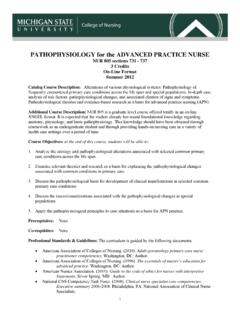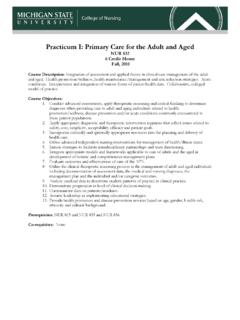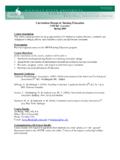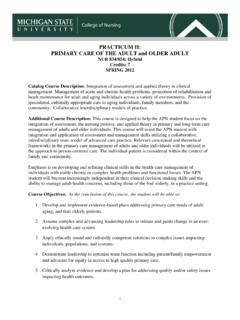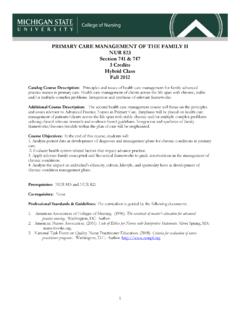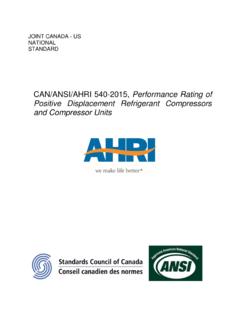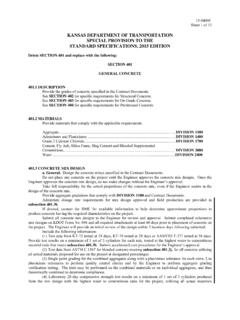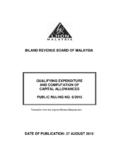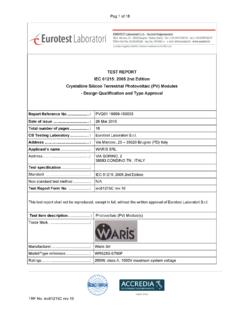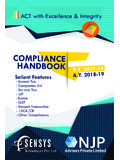Transcription of Clinical Nurse Specialist Role Immersion - College …
1 1 Clinical Nurse Specialist Role Immersion NUR 864 Sections 732 & 736 6 Credits (1 credit theory/5 credit Clinical ) Online Course Spring 2015 Course Description: Synthesis, integration, and Clinical application of the essential concepts and knowledge associated with the roles of the Clinical Nurse Specialist (CNS). Course Objectives: At the end of this course, students will: 1. Demonstrate process leadership skills by engaging in change and policy setting that influences the quality of health care within a system. 2. Synthesize theory and research findings to promote efficient use of resources. 3. Demonstrate leadership role characteristics in collaboration with members of the health care team to impact organizational effectiveness for improving patient health care outcomes. 4. Engage in outcome evaluation methods to analyze system characteristics and organizational effectiveness. 5. Demonstrate proficiency in the Clinical Nurse Specialist role competencies across the three spheres of influence.
2 6. Assume responsibility for professional growth, lifelong learning and health practice leadership Prerequisites: NUR 862 and (NUR 841 or concurrently) and NUR 801 and NUR 803 and NUR 805 and NUR 809 and NUR 815 and NUR 860 Co-requisites: None Professional Standards & Guidelines: The curriculum is guided by the following documents: 1. American Association of Colleges of Nursing. (2011). The essentials of master s education for advanced practice. Washington, DC: Author. 2. Adult-Gerontology Clinical Nurse Specialist Competencies. (2010): American Association of Colleges of Nursing. 3. American Nurses Association. (2010). Code of ethics for nurses with interpretive statements (3rd ed.). Silver Spring, MD: Author. 4. National CNS Competency Task Force. (2006). Clinical Nurse Specialist core competencies: Executive summary 2006-2008. Philadelphia, PA: National Association of Clinical Nurse specialists . Lead Faculty: Valerie Pfander MSN, RN, ACCNS-AG, CPAN Instructor East Lansing, MI 48824-1317 E-mail: Office Hours: Mondays 6:00 -8:00 , additional times can be arranged to accommodate student schedules.
3 2 Kathleen Poindexter, PhD, RN, CNE Asst. Professor, coordinator A109 Life Sciences East Lansing, MI 48824-1317 E-mail: Office Hours: Fridays 2:00 4:00 (call or virtual). Additional times can be arranged to accommodate student schedules. Clinical Faculty: Kathleen Bair MSN, RN, AGCNS Instructor, Clinical MSU College of Nursing Linda Hansen MSN, RN, ACNS-BC, ACCNS-AG Instructor, Clinical MSU College of Nursing Toll Free #: 1/800/605-6424 E-mail: Office Hours: Wednesdays 12:00 noon 2:00 Additional times can be arranged to accommodate student schedules Office hours (in-person, telephone, or technology) will be arranged with the individual student to meet the needs of the student & faculty schedules Faculty responsibilities: Professor Pfander will be responsible for the overall didactic lessons, exams and overall course.
4 Contact Prof. Pfander with any questions regarding exams, lessons and grading. Dr. Poindexter is the program coordinator and is responsible for program oversight, scholarly projects and Clinical placements. Professor Bair is a Clinical faculty responsible for providing oversight to an assigned group of students in the Clinical settings. Responsibilities include communication with faculty, preceptors, and students on a regular basis. Additional responsibility includes evaluation of student Clinical performance and Clinical written assignments. Professor Hansen is a Clinical faculty responsible for providing oversight to an assigned group of students in the Clinical settings. Responsibilities include communication with faculty, preceptors, and students on a regular basis. Additional responsibility includes evaluation of student Clinical performance and Clinical written assignments. Students are to contact their assigned Clinical faculty for Clinical related concerns and theory faculty for theory course issues.
5 Faculty Contact: Faculty are available via email or by phone throughout the week. Please use the email located within the course D2L program to contact the appropriate faculty member. Email ought to be addressed to the specified faculty only and not to the entire class in an effort to reduce overall course emails and inappropriate messaging. Every effort will be made to return your email or call 3 as soon as possible generally within 48 hours during regular week days. In an emergency contact the faculty directly via phone or CNS concentration Coordinator. Note: During the weekends and Holidays faculty members may not be available to respond to calls or emails. Required Texts: Ackley, , & Ladwig, (2014). Nursing diagnosis handbook: An evidence-based guide to planning care (10th ed.). St. Louis, MO: Elsevier Health Sciences. American Geriatrics Society. (2014). Geriatrics at your fingertips (16th ed.). Mechanicsburg, PA: Fry Communications. Order online at American Psychological Association.
6 (2010). Publication manual of the American Psychological Association (6th edition; 2nd printing). Washington DC: Author. Duffy, M., Dresser, S., & Fulton, (Eds.). (2009). Clinical Nurse Specialist toolkit: A guide for the new Clinical Nurse Specialist . New York City, NY: Springer Publishing Company. Fulton, , Lyon, , & Goudreau, (Eds.). (2014). Foundations of Clinical Nurse Specialist practice. (2nd ed.). New York City, NY: Springer Publishing Company. Hamric, A. B., Hanson, C. M., Tracy, , O Grady, (Eds.). (2014). Advanced practice nursing: An integrative approach. (5th ed.). St. Louis, MO: Saunders Elsevier Hickey, J. V., & Brosnan, C. A. (2012). Evaluation of health care in quality in advanced practice nursing. New York City, NY: Springer Publishing Company. Melnyk, B. M. & Fineout-Overholt, E. F. (Eds.) (2011). Evidence-based practice in nursing & healthcare. (2nd. Ed). Philadelphia, PA: Wolters Kluwer Health. Required Resources, References, & Supplies: D2L Help Line (24 hrs, 7 days/week) (24 hrs, 7 days/week) Always check with the D2L Help Line first!
7 Learning Methodologies: This online course is supported by the D2L course management system. A lesson plan will be available weekly and located in module folders. The lesson plan will include the weekly objectives, competencies, presentation, required readings, class and Clinical student activities. A complete set of folders will be available in the course that includes a course overview, assignments, grading rubrics, drop boxes, and discussion forums. Students are required to review all course materials prior to beginning the introductory lesson. This course is not based on a self-paced learning model. Weekly assignments are due to be posted by 2355 (11:55 pm Eastern Standard Time [EST]) on Tuesday evenings unless otherwise instructed by the faculty or noted in calendar. Instructions will be found in the weekly lesson plans & in course announcements. 4 As adult learners, it is expected that students will complete relevant readings and study the identified weekly topics.
8 Students are held accountable for reviewing assignment rubrics to determine how your work will be evaluated. Students are encouraged to contact the appropriate faculty with questions or for clarification of expectations. The expectation is that students will be prepared to participate/engage in the class discussions, activities, and apply learned content within the Clinical setting. It is expected that students will search literature outside of the assigned textbook readings and suggest/share relevant findings with faculty and classmates. If faculties post a question, the expectation is that it will be answered. If faculties email a student, it is expected that the student will respond that they have received the email communication. It is expected that students will be active participants in the classroom via D2L. Access to NUR 864 through D2L You can access the class by going to The course will not open until the official start of the MSU spring semester.
9 Technical problems with the use of D2L should be referred to the D2L Help Desk & not emailed to course faculty. The toll free D2L help line number is listed above. If you have difficulty during a timed assignment, you need to contact the D2L Help Desk so a communication log is created. If you do not do this, faculty have no way to determine that you actually experienced problems and you may not be allowed to resubmit your work. The course will close May 15, 2014 @ 1700 (5:00 pm, ESDST). Evaluation Methods, Parameters & Activities: Grades will be determined by adding all of the course activities (both theory and Clinical ) together and arriving at a specific number. Each course activity has been assigned a percentage (%) which translates to weight of the activity compared to the totality of the course. Class activities (assignments) throughout the semester o A brief explanation of each is provided below o Additional and more specific information can be found in D2L & the course calendar Progress in the course will be discussed individually with each student as needed o Progress reports/evaluations and strategies for achievement will be completed for those students not earning 80% at mid-semester Active, relevant, professional and ethical participation (in the Clinical setting, via email, online, by telephone, or in person)
10 Is expected Communication that is deemed unprofessional, negative, unacceptable or detrimental to student learning may be deleted from the course by the faculty o Any communication that is deleted will not count toward earning course points Late assignments will not be accepted and 0 points will be assigned to the activity o Unless prior arrangements have been made with the faculty Students must complete every assignment, in a timely manner, in order to pass NUR 864, it is not an option to not complete an assignment o If a student has an emergency situation, the expectation is the lead or Clinical faculty will be contacted prior to the assignment due date and time to make alternative arrangements 5 Directions for submission of all written work must be followed for formatting accuracy. Documents not submitted utilizing the course format will either not be accepted or receive a point deduction per faculty discretion. Precepted Clinical Practicum 220 hours over the semester (minimum) The Clinical experience is preceptor supervised Faculty guided and graded Approximately 16 20 hours per week with a certified CNS (preceptor) for 14 weeks (guideline).


